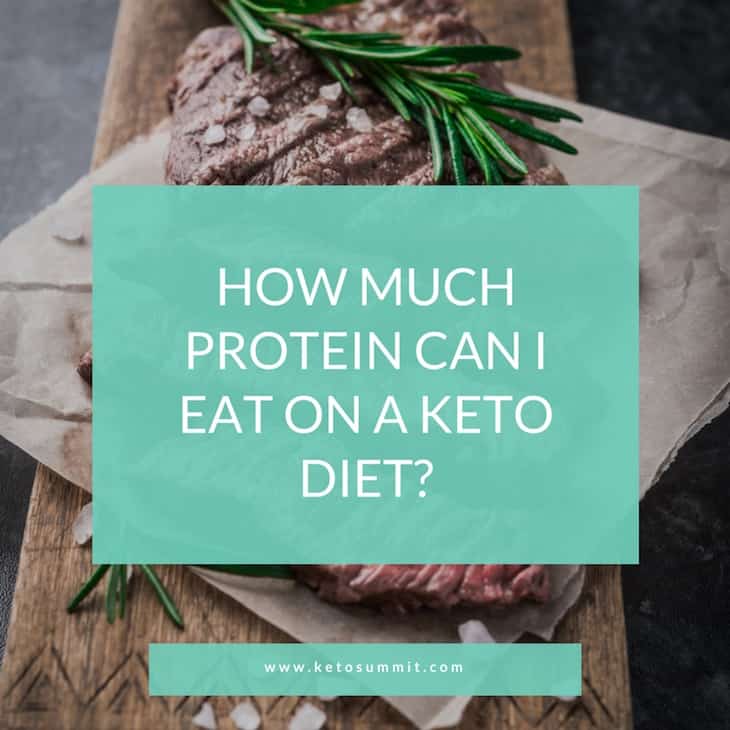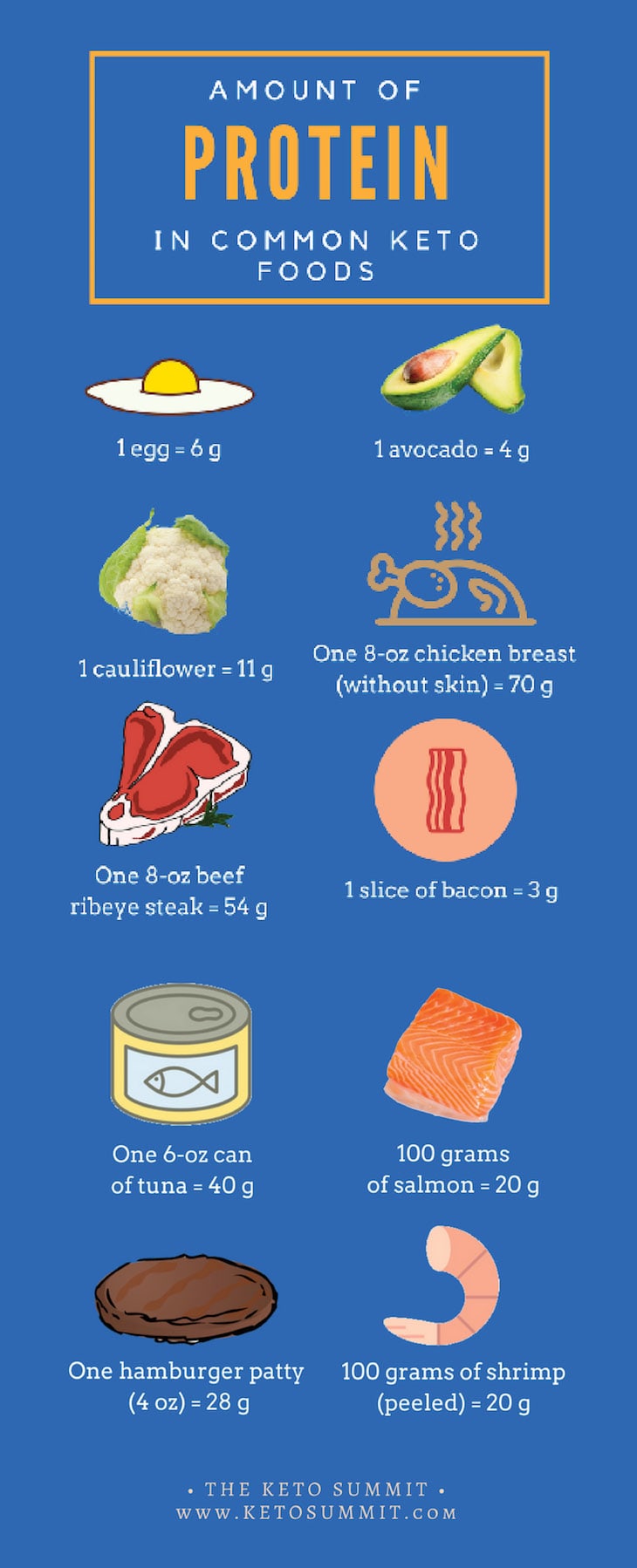How Much Protein Can I Eat on a Keto diet?

Wondering how much protein you can eat on a Keto diet?
I was definitely confused about that when I first started Keto. Some people warned about not eating enough protein.
While others told me I was eating too much protein and it was ruining my Keto diet.
So, what’s the optimal amount of protein to achieve the results you want from Keto?
That’s what I’ll cover in this article.
How much protein is optimal on Keto?
Eating too little protein can mean you lose too much muscle when you lose weight. But eating too much could cause your body to turn that excess protein into glucose and thereby knock you out of ketosis.
There’s not a general consensus on this issue…
But below are some good guidelines to follow when determining how much total daily protein you need on Keto.
Calculate Your Protein Needs On Keto Using This:
- Figure out your body fat percentage.
- Multiply your body fat percentage by your weight. This gives the amount of your fat.
- Your lean body mass = Your weight – Your fat amount (from above).
- The amount of protein you should eat = 0.8 * Your lean body mass (in lbs)
If you use metric units and prefer Kg calculations, then multiply your lean body mass in Kg by 1.8.
And if you’re having a hard time doing these calculations or estimating your body fat percentage, then we’ve created a Keto macros calculator to help you out. Enter the information it asks for and it’ll provide your total daily protein, calories, fat, and net carbs intake. But remember, these are just guidelines – things will vary for your specific needs, health conditions, and activity level.
Bottom Line:
Bottom Line: Use our Keto macros calculator to easily estimate how much protein you should eat on Keto.
What does that much protein look like in terms of steaks and chicken breast?
For most of us, when you do these calculations, we should eat around 90-120 g of protein per day.
So this is 1.5 chicken breasts or two 6-8-oz steaks per day.
Here are the protein amounts in some common Keto foods:

- One large egg = 6 g protein
- One large avocado = 4 g protein
- One medium head of cauliflower = 11 g protein
- One 8-oz chicken breast (without the skin) = 70 g protein
- One 8-oz beef ribeye steak = 54 g protein
- 100 grams of salmon = 20 g protein
- 100 grams of shrimp (peeled) = 20 g protein
- One hamburger patty (4 oz) = 28 g protein
- One 6-oz can of tuna = 40 g protein
- One slice of bacon = 3 g protein
Of course, if you go for fattier cuts of fish and meat, then you’ll find that it contains less protein and more fat instead. It’s another reason why we always suggest eating the skin on fish as well as on chicken and going for fattier cuts of beef and pork.
Bottom Line:
Bottom Line: Most people can have a steak, an egg, and probably a chicken breast in one day and be ok with their protein intake. Of course, this can really vary depending on your protein needs.
What if you eat too much protein on Keto?
The common fear on Keto is that if you eat too much protein, then you won’t lose weight.
But is this true??
The idea is that the excess protein gets turned into glucose which spikes your insulin, lowers your ketone levels, and kicks you out of ketosis.
But as you’ll discover below, this idea is highly debated.
So, just because you hear some people talk about how too much protein kicks you out of ketosis, doesn’t mean it’s true.
How could eating too much protein prevent ketosis?
According to Sports Nutritionist Rudy Mawer, CISSN, “Protein should be moderate, as a very high intake can spike insulin levels and lower ketones.”
Theoretically, when you eat excess protein, it can trigger gluconeogenesis: the process which turns proteins into glycogen (a type of stored glucose).
And the idea is that your body will use this glucose for fuel instead of using ketones, so you won’t get the fat-burning benefits of ketosis.
However, not everyone agrees that too much protein can prevent ketosis
It looks like a lot more research needs to be done before we know for sure…
- “We haven’t found any solid evidence to support the idea that excess protein is turned into glucose. More experiments are needed to confirm that this still holds true in keto dieters.” (1)
- “The key = less than 20 grams of carbs per day. The lesson = high protein intake doesn’t erode glucose control or kill ketones in the context of carbohydrate-restriction.” (2)
Bottom Line:
Bottom Line: There isn’t conclusive evidence that protein can prevent ketosis. So, our recommendation for Keto is to decrease your net carb intake first and then if you’re not getting the results you’re expecting, then look into your protein intake.
How Much Protein Should I Eat on Keto? — Here’s What The Keto Experts Said:
Because there’s a lot of varying views on protein intake on Keto diets, we’ve included some quotes from Keto experts below.
In general, the consensus seems to be that we need protein, but the exact amount we need really depends…
Ever heard of a protein sparing modified fast? Listen to our podcast here for yet another aspect of this whole protein on keto thing.
Dr. Tommy Wood, M.D., PhD.

Robb Wolf

“Protein intake for Americans should really be between 90 and 125 grams of protein per day. If you’re getting this from meat, that looks like around 12oz – 16oz of meat a day. Break that between three meals, and this is 4-6oz of animal protein per meal.” (5)
Dominic D’Agostino

“Keep your protein between 1g- 1.5 g/kg per day. This is optimal to staying in nutritional ketosis. But protein can be insulinogenic and excess protein can feed into the gluconeogenesis metabolic pathway and kick you out of ketosis. Higher protein is only needed in people who are more active and work out a lot.” (6)
Marty Kendall

“The Daily Recommended Intake (DRI) for protein is 0.84g/kg of body weight (BW)…[However], [t]he average protein intake for the general western population is about 1.2 g/kg LBM or around 16% of calories… It seems that most people get enough protein without trying too hard. However, what constitutes as “enough” protein will vary depending on whether you are going through puberty, weight lifting, a middle-aged sedentary office worker or an elderly person in a nursing home.”
“I think the real problem with eating ‘too much protein’ is that once our protein goes too high we end up reducing the amount of vitamins, minerals and essential fatty acids that our food contains. While it is important to get adequate amino acids, it is also important to get adequate vitamins, minerals, and essential fatty acids.” (7)
Luis Villasenor

Excess protein is “whatever is more than your body actually needs for optimal function: hormones, tissue (not just muscles) repair and building. At Ketogains we suggest 0.8g protein PER LB LEAN BODY MASS which gives you an extra buffer for whatever needs arise (a bit more is not bad, and will not impair ketogenesis). So, what would be excess? Anything above that.” (via email exchange)
How To Check You’re Eating A Good Amount Of Protein?
As many of the experts above stated, protein is essential for our bodies to function correctly. So, don’t under-eat protein in your quest to achieve high ketone levels! (Plus there are other ways to boost ketone levels, if necessary!)
If you’re just looking to maintain your muscle mass, then a rough guide for protein is to consume 0.8 g of protein per lb of lean body mass.
Therefore, it may be best to spread out your protein intake evenly among two or three feedings rather than consuming most of it at one meal – at least if you want to increase your muscle mass.”
Therefore, it may be best to spread out your protein intake evenly among two or three feedings rather than consuming most of it at one meal – at least if you want to increase your muscle mass.
If you’re looking to build more muscle, then you’ll need to consume a bit more protein (approx. 0.9-1 g of protein per lb of lean body mass).
According to Registered Dietitian Franziska Spritzler, RD and Dr. Andreas Eenfeldt, M.D., “Research has suggested that your body needs about 20-30 grams of protein at each meal to ensure that amino acids get incorporated into your muscles. Therefore, it may be best to spread out your protein intake evenly among two or three feedings rather than consuming most of it at one meal – at least if you want to increase your muscle mass.”
If you’re not sure how to calculate lean body mass, scroll up to the explanation above or check out this article.
Then use a tracking app like My fitness pal to make sure you’re not under-eating protein or overeating by too much!
If you want to take a step further and make it more accurate, then remember that you’ll need to re-calculate your protein allowance periodically to take into account changes in your lean body mass.
What are good sources of protein on the Keto Diet?
Try to stick with real foods where possible. While protein powders can be useful if you’re vegetarian or vegan,
we suggest going for whole foods. Enjoy meat, organ meat, fish, and seafood – these are great sources of protein.
As with any food, quality matters in addition to quantity! So, buy grass-fed meat (e.g., from ButcherBox or US Wellness Meats) if you have access to it and can afford it. They contain more nutrients, so you can get your protein needs as well as your vitamin and mineral requirements.
Keto foods with approx. 37g protein (per 150 g serving)
These foods are higher in protein because they’re lower in fat (and have practically zero carbohydrates).
- Turkey
- Tuna
- Sea bream
These Keto foods have 28-30g of protein (per 150 g serving)
These Keto meats and fish are higher in fat and therefore correspondingly lower in protein.
- Chicken thighs
- Beef steak (ribeye), Pork loin, Lamb chops
- Venison steak
- Salmon, cod, sardines, mackerel, sea bass
Other Keto sources of protein
Other good sources of protein include eggs, dairy, nuts and seeds.
Keto foods with 7-8g of protein (per 30 g serving):
- Pumpkin seeds
- Feta cheese
- Hard full-fat cheeses like cheddar
***Note – while many people recommend cheese and full-fat dairy on Keto diets, for health and weight loss reasons, we highly recommend avoiding dairy except for ghee while you’re on a Ketogenic diet.
And these keto foods have 5-6g (per 30 g serving):
- Sesame seeds/tahini paste
- Sunflower seeds
- Pistachio nuts
- Almonds
Lastly, these keto foods have 2-4g (per 30 g serving)
- Walnuts, Hazelnuts, Brazil nuts
- Pine nuts
- Pecans
- Macadamia nuts
Bottom Line:
Bottom Line: Meat, Fish, and Seafood are the best sources of meat. Eggs, dairy, nuts and seeds are secondary. But buy
Should you include protein supplements in your diet?
Most folks should need to include protein supplements (like protein powderS) as part of their keto diet – you should easily be able to meet your daily protein needs by eating nutrient-dense whole foods, like those mentioned above.
Some recipes, especially those for shakes and smoothies, list protein powder in their ingredients: if you’d like to try those out just be careful to pick a protein powder that doesn’t contain artificial sweeteners, preservatives, soy or processed milk powder.
I’m personally a fan of the Equip Beef Protein (made from grass-fed beef, no dairy products, no whey, no soy, no preservatives). The chocolate flavor has just stevia and unsweetened cacao powder.
Bottom Line:
Bottom Line: You really don’t need protein supplements. But if you choose to use them, make sure they don’t have artificial sweeteners, preservatives, or soy/processed milk powder like Equip Beef Protein.
Don’t Stress About Protein – Just Focus on Carbs At First
I know one of the main problems with a ketogenic diet is trying to figure out if you’re doing it correctly.
Are you getting enough fat? Are you eating too many carbs or too much protein?
That’s why we’re trying to make things simple.
To get started on Keto, don’t stress out about your protein or fat intake initially. Just focus on getting your net carb intake under 25 g daily.
If you need to eat more protein at first because you’re unsure how to add healthy fats into your diet (or if you have trouble digesting fats), then that’s ok.
There’s time to tweak your Keto diet after you start.
And if you don’t want to think about all the macro calculations, then check out our Keto Meal Plans for effortless keto.
